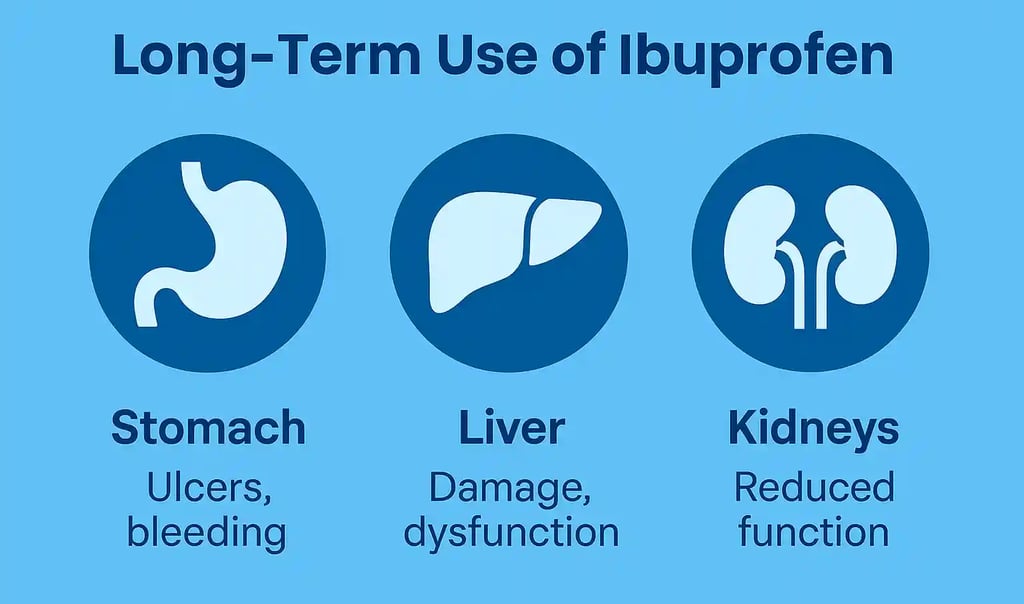Long-Term Ibuprofen Use: Side Effects on Stomach, Liver, and Kidneys
Discover the side effects of long-term ibuprofen use. Learn how extended ibuprofen can affect your stomach, liver, and kidneys, and what risks come with daily NSAID use.


Long-Term Ibuprofen Use: Side Effects on Stomach, Liver, and Kidneys
Ibuprofen is a widely used over-the-counter medication, but long-term or frequent use can come with serious health risks, as follows:
Potential Long-Term Effects of Ibuprofen
– Stomach Damage
Long-term use of ibuprofen has the potential of irritating the stomach lining, increasing the risk of gastritis, ulcers, or gastrointestinal bleeding. Symptoms may include persistent stomach pain, heartburn, or black stool.
– Liver Stress or Damage
Although rare, prolonged or high-dose use has the potential to adversely affect your liver function. This is more likely in individuals with pre-existing liver conditions, or those taking other liver-impacting drugs. Symptoms may include fatigue, nausea, or yellowing of the skin or eyes (jaundice).
– Kidney Function Decline
Regular ibuprofen use has the potential to reduce blood flow to the kidneys, which may lead to kidney damage over time. This risk is higher in older adults, those with existing kidney disease, or those who take ibuprofen alongside diuretics or ACE inhibitors.
– Higher Risk When Combined with Alcohol or Other Drugs
Taking ibuprofen regularly while consuming alcohol or other medications (like blood thinners or corticosteroids) has the potential to further increase risks to your liver and stomach lining.
– Increased Blood Pressure
Chronic use of NSAIDs like ibuprofen has the potential to cause a rise in blood pressure, especially in those with hypertension or heart disease.
FAQs
Is it safe to take ibuprofen every day?
Daily use may be safe for short periods of time and under medical supervision, but long-term daily use increases the risk of organ damage and other serious side effects.
How long is too long to take ibuprofen?
Most guidelines suggest limiting regular use of ibuprofen to 10 days for pain, or 3 days for fever, unless otherwise directed by a healthcare provider. Longer use should be monitored closely by a healthcare provider.
Can ibuprofen cause permanent kidney damage?
Yes, especially in people with pre-existing kidney issues or when used in high doses over time. This damage may be reversible early on, but it can become permanent if ignored.
How do I protect my stomach while taking ibuprofen?
Take ibuprofen with food or milk, avoid alcohol consumption while taking Ibuprofen, and consider talking to your doctor about protective medications like proton pump inhibitors if long-term use is needed.
What are the signs I should stop taking ibuprofen? Seek medical attention if you notice black stool, experience severe stomach pain, jaundice, unusual fatigue, or changes in urination.
Disclaimer
This page summarizes information from trusted medical sources and is provided for general knowledge only. lt is not medical advice; Always consult your doctor or pharmacist for personal medical guidance (For a more comprehensive explanation please see the full disclaimer).
Resources
The information above has been gathered from several reputable sources, including the following:
[1] Mayo Clinic – Ibuprofen (Oral Route)
[2] FDA – NSAID Medication Guide
[3] Harvard Health – NSAIDs and Your Kidneys
[4] National Kidney Foundation – Pain Relievers & Kidney Health


